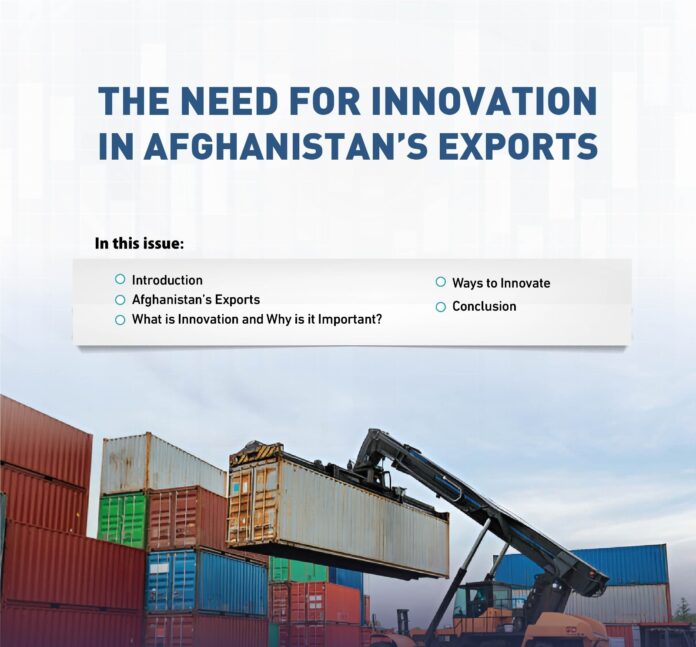Introduction
Afghanistan holds significant economic value in the region due to its unique geographic location. Although Afghanistan is primarily a consumer and import-dependent country, its exports also constitute an essential part of its economy. To achieve economic stability and support domestic production, it is crucial to expand and strengthen foreign trade. The development and reinforcement of foreign trade largely depend on aligning exports with international market demands. For this purpose, Afghan traders must introduce innovation in their exports. This will not only strengthen Afghanistan’s industry and agriculture, fostering economic stability and progress, but also ensure Afghan traders establish and sustain a consistent presence in the global market. This article provides a brief overview of Afghanistan’s exports, the need for innovation in this area, and strategies for fostering such innovation.
Afghanistan’s Exports
Although Afghanistan is primarily a consumer and import-dependent country, it has the potential to export a wide range of goods. The main export items of Afghanistan include dried and fresh fruits, precious and semi-precious stones, coal, carpets, non-alcoholic beverages, steel rods, saffron, and others.
Exports play a crucial role in strengthening Afghanistan’s domestic economy and creating employment opportunities. In 2024, Afghanistan exported goods worth approximately $2 billion to other countries. As a result of the efforts of the Islamic Emirate, Afghanistan is now self-sufficient in 137 types of goods. The production of these goods has reached a level that satisfies domestic needs, with surplus quantities being exported to other countries.
The Islamic Emirate aims to transform Afghanistan into an export-oriented and industrialized country. However, one way to increase the current level of exports is through innovation, which can help Afghan products reach more international markets.
What is Innovation and Why is it Important?
Experts define innovation as new methods, ideas, or services that have significant impact and value. Innovation involves creative concepts that produce tangible results and foster efficiency. Innovation is as essential in exports as in other areas. For successful exports and sustained competitiveness in the market, traders and industrialists must incorporate innovation into their products. Innovation in exports paves the way for economic growth and sustainable development.
The purpose of innovation in exports is not merely to increase the volume of exports but to adopt strategies that enhance quality, introduce diversity, and increase the overall value of exported goods. Innovations can lead to the creation of new products or improve existing ones. They transform traditional exports into modern, market-oriented forms, contributing to increased export levels and better market penetration.
In today’s competitive global marketplace, only those who can innovate and adapt will succeed. Competitiveness in exports cannot be achieved without innovation. Therefore, to secure a foothold in the international market, traders must innovate in their products to avoid being phased out. For instance, a carpet trader aiming to compete in the global market must design carpets according to contemporary demands, incorporating new patterns and designs. The trader must also focus on improving the quality of materials used. Outdated designs or poor-quality materials can lead to unsold products and financial losses. A lack of innovation may eventually result in the trader losing their market position and facing business decline.
Similarly, the export of dried and fresh fruits also requires innovation, especially in terms of standard packaging. For example, traders should use environmentally friendly and health-conscious packaging materials. They should also provide online sales options and use QR codes to align exports with global market demands, ensuring better access to international markets and increased export volumes.
The Islamic Emirate is striving to foster innovation in exports by establishing processing zones in commercial hubs across the country. These initiatives aim to ensure that Afghan exports meet international standards and gain a competitive edge in global markets. Innovation in exports is vital for Afghanistan’s economic stability, sustainable development, expansion of trade relations, boosting national confidence, and creating job opportunities.
Ways to Innovate
Innovation does not occur spontaneously; rather, it is a result of human effort to adapt and evolve in response to the demands of the time. Like other sectors, exports require innovation, and failure to innovate in a timely manner can lead to significant economic challenges for a country. There are several ways to foster innovation, two of which are highlighted below:
Investing in Research:
Research is critical. One of the secrets behind the progress of Western countries is their emphasis on research-oriented thinking and the presence of research institutions. Numerous research and academic centers in these countries provide guidance and formulate policies. Afghanistan lacks such infrastructure in this area. It is essential to establish research centers—whether large or small—to investigate market demands for innovation and keep stakeholders informed. Investing in research is not a loss; on the contrary, it benefits the nation and the economy.
Education and Skill Development:
The world is changing rapidly. To closely observe these changes and acquire the necessary knowledge, it is vital to send individuals abroad for practical training. These individuals can learn techniques firsthand and bring their expertise back to their country for implementation. Therefore, having skilled and experienced workers is crucial for the economic advancement of any nation.
Conclusion
Innovation in exports is a necessity of the time, and traders must align their efforts with market demands. Such innovations are essential for the growth of trade, economic stability, and progress of the country. Innovation contributes to national confidence and the creation of employment opportunities.
To survive and compete in the global market, it is imperative to introduce innovations in exports. Traders must stay informed about global market trends and demands and tailor their exports accordingly to avoid being excluded from the market.


